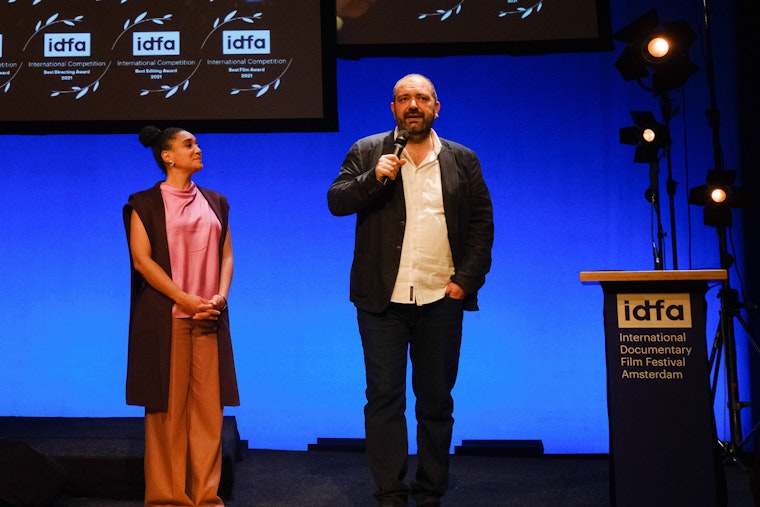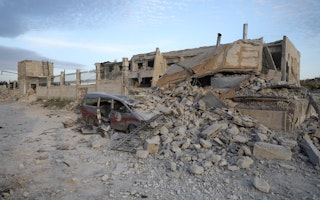Q&A: Harnessing the Power of Documentary Storytelling

Orwa Nyrabia grew up in Syria among a family of political dissidents. Now exiled from his home country, his harrowing experiences there helped shape his vision of the world and his devotion to telling stories through creative nonfiction. His 2013 documentary on Syria, Return to Homs, won many awards, including the Grand Jury Prize at the 2014 Sundance Film Festival. Today, he is artistic director of the International Documentary Film Festival Amsterdam (IDFA), one of the world’s most prestigious documentary events. Nyrabia spoke to Open Society about his childhood, the reality of war in Syria, and how his partnership with the Foundations has helped his storytelling.
What did your childhood look like?
I was born in 1977, born and raised in what came to be known as Syrian President Hafez al-Assad’s Syria. By 1980, my father and both uncles, maternal and paternal, had become political prisoners, and my mother, who was a hardworking engineer and activist, slept every night wondering if she too would get detained, and wondering whether her husband and brother would be released. We were a family engaged in the arts, politics, philosophy, science, in different ways. My wider family in Syria was a family of dissidents and political prisoners. They essentially opposed all manner of dictatorships, and defended social justice, without being pro Soviet or pro West. It was impossible for a child in that environment to be shielded from whispers and discussions about political oppression. I escaped through the world of imagination. I wanted to become a filmmaker. That was my dream.
How did your actual transition to a career in documentary filmmaking begin?
There was no film school in Syria so I chose to study at the Higher Institute of Dramatic Arts in Syria. Acting seemed the closest thing to filmmaking. I spent four years studying, and acted in a film or two. I didn’t end up making films in Syria. To do so, you either had to be part of the regime’s corruption, and I had no clout there, or work for government institutions that were closely linked to the intelligence services. So, I thought of documentary filmmaking as a lower budget form of artistic expression that is political and creative at the same time. I was inspired by the exiled Syrian documentary filmmaker Omar Amiralay. I loved his 1982 film The Misfortunes of Some and its protagonist Haj Ali, an ambulance and taxi driver navigating through Lebanon’s streets during the civil war. I thought to myself, “it’s not necessary to act. You can do something brilliant with real people, and it doesn’t require the budgets of fiction work.” While my aspirations were building up, I made money writing for a newspaper in Lebanon. Shortly afterwards I met my now work and life partner Diana El Jeiroudi, and we started a company in Damascus in 2002, producing ads here and there. We went to the IDFA. I met Fred Weisman, the great American living legend of documentary film. He invited me to have a beer and a chat with him. I was moved by his humility. Diana said we should have a film festival like the IDFA in Syria. And so, in 2008 we launched Dox Box, the Arab world’s first documentary film festival.
How did you manage to show the films in such a closed political and social environment as Syria’s?
We had to negotiate everything and were at the whims of the censors. We decided we should select films that show a parallel reality. If we showed, for example, films set in Poland under the Communist regime, or set in Burma, the authorities in Syria would let them pass. But the audience would not leave the cinema talking about Poland or Burma. They would talk about the situation they witnessed—the human struggle involved. It was a way of disseminating liberating ideas indirectly.
How did your partnership with Open Society come about?
When the revolution began in Syria in 2011, Diana and I used funding we received from cultural organizations to in turn fund young filmmakers documenting the events that were happening in Syria. They needed equipment. Through a grant from Open Society we were able to bring a professional camera into Syria to film events. Open Society was worried for the safety of those who would use the camera. There were debates back and forth, and in the end Open Society agreed to fund it. What we shared with Open Society was faith in the power of films, and a necessity to take part in a historical moment for our country and our people.
It’s well-known that you were arrested by the Syrian regime. Was this in connection to the footage filmed during the war?
Yes, that was in 2012. I was held incommunicado in detention for three weeks. I was squeezed into an underground cell with five other people in inhumane conditions, tortured collectively and individually. My personal experience was much easier than for many of those around me, but it was life-altering to witness the pain of people in those cells. My detention was cut short because of the international campaign to help me led by my partner Diana. What came of it should be a case study in campaigning! No governments had spoken for my freedom, no state department. It was entirely the film community that defended my freedom. Film stars like Robert De Niro and Martin Scorsese and many others spoke up. Had it been a political entity defending me, the dynamics would have been different. I was released and have gone into exile since.
You’ve touted a famous motto: “using cameras instead of guns.” Where did that come from?
That was my pitch when I was fundraising for grassroots activists in Syria. When the Syrian regime imposed a media blackout and cut out electricity, the activists turned to citizen journalism and defined social media in a different way. The camera became a way to mobilize international public opinion. The funds we raised were used to supply hundreds of small Handycams. The cameras revealed the reality of Syria to the world. The biggest enemy of the regime was the camera, not the gun. So many snipers were targeting the people with the cameras. We lost many cameramen and citizen journalists over the last 10 years. Open Society later supported, in 2014 and 2015, an organization that was an offshoot of the Local Coordination Committee. It was called the Violations Documentation Center, which documented who was being killed by whom. I was its director for a while.
How has your experience of Syria impacted your creative work?
I am against a government killing its people. So when someone comes and asks me, “Did you include in the films you have produced the voice of the Syrian regime?” I would say no because they have been trying to kill me and that is their view. It was included in the film Silvered Water, Syria Self-Portrait, which I produced. And that’s my statement. And that’s their view. Acknowledging the impact of subjectivity is what I defend in documentaries and in their ability to change the world—through empathy and identification with the subjects. Claiming neutrality in times of great injustice is certainly not an option, and should not be expected of any artist.
In addition to my work as IDFA’s artistic director, I have recently started a new foundation which I chair called the International Coalition of Filmmakers at Risk to harness the power of the film community globally to help filmmakers at risk—whether they are being prosecuted in Iran or are under threat in Myanmar or Afghanistan. I could have been in prison or died like tens of thousands of political prisoners in Syria. It was the power of the international film community that saved me by just shouting. The number of filmmakers at risk has grown in the past two years, even in places where it had seemed relatively safe for filmmakers, such as Brazil and Eastern Europe.


